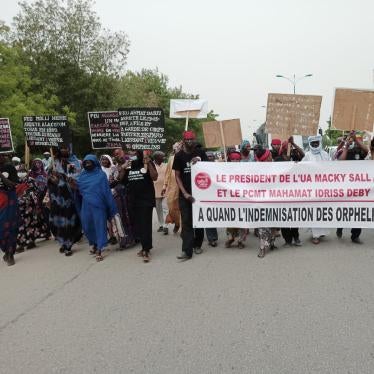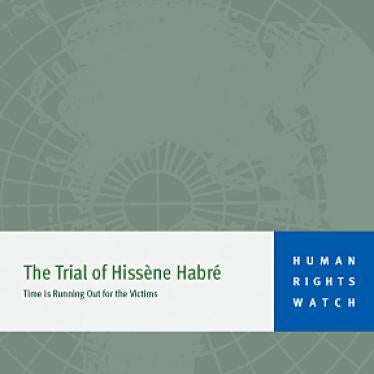(Johannesburg) - The African Union should urge the United Nations Security Council to set up a commission of inquiry to document the worst human rights abuses in Somalia, an essential first step in creating justice and accountability, Human Rights Watch said in a letter released today. The letter was sent in advance of the AU Summit meeting in Sirte, Libya on July 1-3, 2009.
Human Rights Watch urged AU leaders to call for an end to the entrenched and unchecked violence in Somalia, where human rights abuses continue to ravage the country. Tens of thousands of people returned home to Mogadishu, the capital, during a lull in the fighting earlier this year, only to find themselves caught in the middle of renewed conflict. Human Rights Watch also said that the AU should ensure that its mission in Somalia (AMISOM) adheres scrupulously to international humanitarian law. The small and beleaguered peacekeeping force has kept Mogadishu's port open for vital humanitarian supplies, but has been implicated in firing indiscriminately at civilians.
"The Somalia peacekeeping mission is the AU's toughest and most dangerous undertaking in Africa today," said Georgette Gagnon, Africa director at Human Rights Watch. "The AU should ensure that its troops are not drawn into the abuse that surrounds them and that personnel guilty of serious abuses are held to account."
In early February, for example, the peacekeepers came under attack and responded by firing wildly in the vicinity, killing at least 13 Somalis, nearly all civilians. Incidents like this should be promptly investigated, and those responsible, regardless of rank, should be held to account, Human Rights Watch said. Any new troops contributed to the peacekeeping force should be adequately vetted to ensure that they have not been implicated in serious abuses.
Human Rights Watch also urged the AU to encourage Senegal to move proceedings forward in the case of the former president of Chad, Hissène Habré, who stands accused of crimes against humanity. In July 2006, the AU mandated Senegal to prosecute Habré and made a commitment to provide financial support for the effective conduct of the trial. Three years later, despite offers of assistance to Senegal from outside Africa, it has failed even to begin proceedings, and the AU has provided no concrete assistance. Human Rights Watch said that if the AU acts effectively to move the Habré case forward, it would demonstrate Africa's capacity and will to deal speedily with atrocities committed on the continent.
In addition, Human Rights Watch called on the AU to support the work of the International Criminal Court (ICC). Earlier this year, the arrest warrant for President Omar al-Bashir of Sudan for war crimes and crimes against humanity in Darfur led some in Africa to label the court as "anti-African," and to accuse it of unfairly targeting Africans. Three of the four African situations being investigated by the ICC, however, were voluntarily referred by the countries where the crimes were committed, and the fourth, Darfur, was referred to the court by the UN Security Council.
At a meeting on June 8 and 9 convened by the AU in Addis Ababa to discuss the ICC, many African states reiterated their commitment to upholding their obligations under the ICC statute. African civil society groups and leaders, in statements signed in recent conferences in Banjul, Cape Town, and Addis Ababa, also expressed strong support for the ICC to provide justice when national courts are unable or unwilling to prosecute.
Human Rights Watch urged AU members to solidify their commitment to the ICC and to preserve its strength and integrity. It recommended that the AU support the establishment of an ICC liaison office in Addis Ababa, the home of the African Union, to strengthen institutional contact and negotiate a cooperation framework between the two institutions.
"Across Africa, governments and civil society organizations have endorsed the work of the ICC," said Gagnon. "Building on this month's meeting in Addis Ababa, we look to African leaders to deepen the AU's commitment to supporting mechanisms, such as the ICC, that provide justice to African victims of the most serious human rights abuses."







